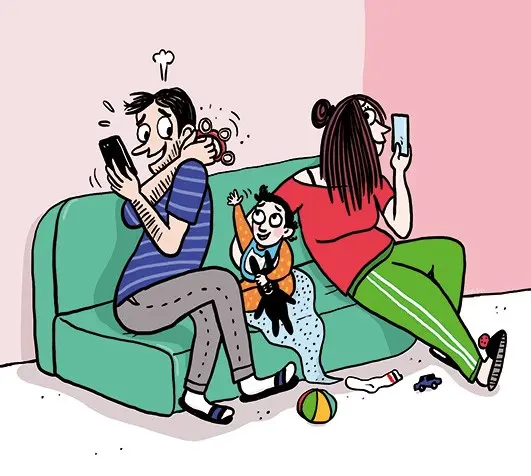Smart Toddlers
The smartphone has become an essential part of our daily lives. But up to now, little is known about how smartphone use affects the parent-child relationship in early childhood. The Smart Toddlers research study aims to generate new findings on this question.

Background
We are interested in the influence of parental smartphone use on parent-child interaction, in mobile device use by the child and in various aspects of child development. Data will be collected by online questionnaire at three time points: when the child is 14 months, 20 months, and 3 years old. Additionally, we will conduct interviews with some parents: This will allow more in-depth exploration of parents’ perspectives on their smartphone use and possible influences on the parent-child relationship. Additionally, parent-child interactions will be video-recorded, as we would like to learn more about children’s reactions to smartphone use.
Objectives
Up to now, young parents have not really had outside guidance on the question of how the use of digital media can affect their relationships with their children. To be able to provide parents of young children with evidence-based advice on using smartphones, we need detailed research findings on smartphone use and its possible effect on parent-child interactions in early childhood. The Smart Toddlers study will generate such knowledge. This will help us to make research-based recommendations regarding smartphone use in early childhood.
Two departments – one goal
This study was being conducted in cooperation by researchers at the ZHAW School of Applied Psychology and the ZHAW School of Health Sciences under the Swiss National Science Foundation research initiative «Digital Lives».
The research team in the Clinical Psychology and Health Psychology section at the ZHAW School of Applied Psychology conducted research with a focus on psychotherapy, counseling, and diagnostics with adults and children as well as infant research. The research unit at the Institute of Midwifery and Reproductive Health of the ZHAW School of Health Sciences conducted research with a focus on sustainable midwifery to promote the health of women, their children, and their families.
Publications
-
Gemperle, Michael; Hächler, Ramona; Braune-Krickau, Katrin; Schneebeli, Larissa; von Wyl, Agnes,
2025.
Soziale Probleme.
2025(2), pp. 134-150.
Available from: https://doi.org/10.3262/SP2502134
-
2025.
In:
21st International Congress of the European Society for Child and Adolescent Psychiatry (ESCAP), Strasbourg, France, 29 June - 1 July 2025.
-
Schneebeli, Larissa; Braune-Krickau, Katrin; Joliat, Anouk; von Wyl, Agnes,
2025.
Frontiers in Psychology.
16(1517222).
Available from: https://doi.org/10.3389/fpsyg.2025.1517222
-
Braune-Krickau, Katrin; Schneebeli, Larissa; Gemperle, Michael; Joliat, Anouk Céline; von Wyl, Agnes,
2025.
Das Smartphone im Kinderzimmer : elterliche Smartphone-Nutzung in der frühen Kindheit.
In:
4. Early Life Care Konferenz : Ressourcen - Grundlagen für einen guten Start ins Leben : Abstractband.
4. Early Life Care Konferenz, Salzburg, Österreich, 23.-25. Mai 2025.
Salzburg:
Institut für Early Life Care.
pp. 18.
Available from: https://doi.org/10.4126/FRL01-006511915
-
2025.
Handynutzung bei jungen Eltern: Handlungsbedarf?.
In:
Zürcher Präventionstag: Sucht im Wandel – Herausforderungen für die Prävention, Zürich, Schweiz, 7. Februar 2025.
Available from: https://www.gesundheitsfoerderung-zh.ch/publikationen/referate-praeventionstag/praeventionstag-2025
-
2025.
Parental meanings, norms, and emotions regarding smartphone use from postpartum to toddlerhood[paper].
In:
6th Annual Meeting of the Swiss Society for Early Childhood Research (SSECR), Basel, Switzerland, 21-22 January 2025.
-
Braune-Krickau, Katrin; Schneebeli, Larissa; Gemperle, Michael; von Wyl, Agnes,
2025.
Parental smartphone use in early childhood : results from the Smart Start and Smart Toddlers studies.
In:
6th Annual Meeting of the Swiss Society for Early Childhood Research (SSECR), Basel, Switzerland, 21-22 January 2025.
-
Joliat, Anouk; Gemperle, Michael; Braune-Krickau, Katrin; Schneebeli, Larissa; von Wyl, Agnes,
2024.
Das Smartphone beim Stillen : Hilfe und Hürde.
Obstetrica.
121(7), pp. 30-33.
Available from: https://doi.org/10.21256/zhaw-32437
-
von Wyl, Agnes; Hug, Meret; Schneebeli, Larissa; Braune-Krickau, Katrin; Gemperle, Michael; Hächler, Ramona; Wade-Bohleber, Laura,
2024.
Frühförderung interdisziplinär.
43(1), pp. 18-28.
Available from: https://doi.org/10.2378/fi2024.art02d
-
Bleckmann, Paula; Brauchli, Valérie; Denzl, Elisabeth; Hantinger, Marion; von Kalckreuth, Barbara; Klein, Anette M.; Schneebeli, Larissa; Simon-Stolz, Lieselotte; Sticca, Fabio; Uhler, Claudia; Wolf, Martina; von Wyl, Agnes,
2024.
Positionspapier Digitale Medien und frühe Kindheit : Forschungsstand, Wirkungen und Empfehlungen.
Wien:
Gesellschaft für Seelische Gesundheit in der Frühen Kindheit.
ISBN 978-3-00-079075-1.
Available from: https://www.gaimh.org/aktuelles-reader/2-auflage-positionspapier-digitale-medien-und-fruehe-kindheit.html
-
2023.
Vom Sinn und Unsinn der elterlichen Smartphone-Nutzung.
In:
Kantonaler Elternbildungstag "Stark im Familienalltag", Winterthur, Schweiz, 17. Juni 2023.
-
Gemperle, Michael; Joliat, Anouk,
2022.
Das Smartphone und der Alltag junger Eltern.
In:
Stillen und Familie, Volkshaus Zürich, Schweiz, 9. September 2022.
Available from: https://www.stillfoerderung.ch/logicio/pmws/stillen__ftzh2022__de.html
-
2021.
Smart Start und Smart Toddlers.
In:
Referat am Kantonsspital Winterthur, Winterthur, 30. Juni 2021.
-
von Wyl, Agnes; Braune-Krickau, Katrin; Schneebeli, Larissa; Pehlke-Milde, Jessica,
2021.
Smartphones können die frühe Eltern-Kind-Interaktion stören.
Pädiatrie.
26(1).
Project organisation
Project lead
- Professor Agnes von Wyl, ZHAW School of Applied Psychology, Section for Clinical Psychology and Health Psychology
- Dr. Michael Gemperle, ZHAW School of Health Sciences, Institute of Midwifery and Reproductive Health
Project team
- Dr. Katrin Braune-Krickau, ZHAW School of Applied Psychology, Section for Clinical Psychology and Health Psychology
- Meret Isabelle Carmen Hug, ZHAW School of Applied Psychology, Section for Clinical Psychology and Health Psychology
- Larissa Schneebeli, ZHAW School of Applied Psychology, Section for Clinical Psychology and Health Psychology
- Anouk Joliat, ZHAW School of Health Sciences, Institute of Midwifery and Reproductive Health